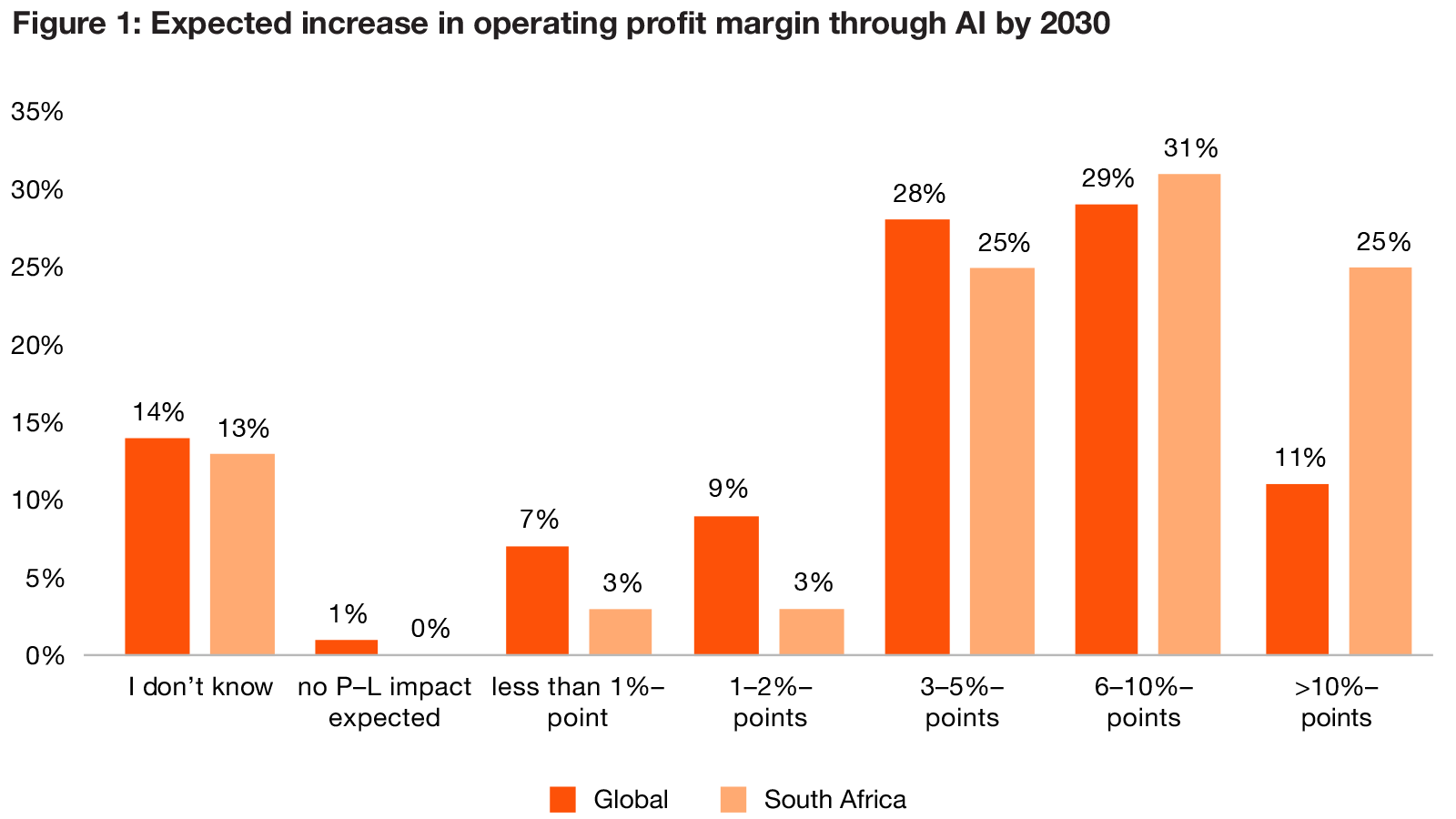Artificial Intelligence (AI), encompassing machine learning and newer developments like generative and agentic AI, is at the forefront of addressing these challenges. By revolutionising procurement, production, R&D, and supply chain processes, AI is reshaping the competitive landscape and enhancing value chains.
Over 400 operations executives from 30+ countries across Europe, the Middle East, and Africa were recently surveyed to provide insights for this study. Globally, the participants are from diverse sectors like manufacturing, transport and logistics and retail. Our findings highlight a strong belief in AI’s potential to enhance profitability, with nearly 70% of global respondents —and 81% of South African respondents—expecting at least a three percentage point increase in operating profits by 2030. Whereas locally, in SA, over 50% of respondents anticipate a more substantial increase of five percentage points or more.

Bridging the AI maturity gap
Although manufacturers are seeing promising impacts from AI, a very small minority —4% globally and 13% locally —report that they are already achieving significant financial benefits and ROI, underscoring a relatively low AI maturity level. Less than a third have moved beyond initial pilot phases, and only about 25% of South African responses qualify as 'AI Operations Champions,' who are systematically implementing AI across their enterprises. Notably, South African AI maturity appears to be substantially higher than the global percentage of 8%. Scaling these efforts will require strategic investment, an area where companies show varied readiness levels.
“AI is revolutionising our approach to operations by drastically reducing the time needed for a whole range of core operations processes, from R&D and supply chain to production and procurement. As AI evolves into an indispensable decision support assistant, it will not only enhance our decision-making processes but also autonomously handle repetitive tasks, driving efficiency and innovation.”
Unveiling the benefits
Our research underscores that the rewards of AI integration are nonetheless significant. AI is increasing sales delivery in volumes, enhancing decision-making, enabling the reduction of operational costs and providing new revenue from additional products and services. Moreover, it is helping address skill gaps within the industry. 'AI Operations Champions' are reaping the most benefits by effectively scaling and integrating AI across their operations. Looking forward, survey respondents anticipate impressive improvements.

Exploring diverse use cases
Globally, supply chain use cases are the most widespread, but the companies we studied are taking advantage of a broad range of applications for AI. The research reveals a number of differences across industry sectors. We explore these in detail in the full paper, including practical examples. For example, the automotive industry shows particular strength in production use cases, while the pharmaceuticals, life sciences and medical technology sectors are highly active in the R&D space.
Overcoming challenges
Gloablly, data management emerges as the primary hurdle to AI adoption, with challenges around data availability, quality and security. This differs locally, where the cost of AI software and the lack of specialised AI experts are the primary concerns. Additional concerns include organisations lack of AI knowledge and organisations resistance to change.
Four principles to accelerate your AI journey
We have identified four core principles that are critical to getting the most value from AI. In our full discussion of these principles, we include examples of what Operations Champions are already doing to drive successful implementation of AI across their organisations.
Contact us

Nqaba Ndiweni
Africa Consumer | Industrial Products and Services (CIPS) Industry Leader, PwC South Africa
Tel: +27 (0) 11 797 4890

Pieter Theron
Industrials and Services Africa Leader, PwC South Africa
Tel: +27 (0) 11 287 0501






















